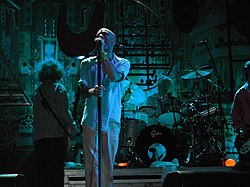
Alternative Airplay is a record chart that ranks the most-played songs on American modern rock radio stations. Published by the music industry magazine Billboard , it was created in the midst of the growing popularity of alternative music on rock radio in the late 1980s. [1] As less-established alternative acts were receiving minimal exposure on album-oriented rock (AOR) radio stations, their labels turned to modern rock stations for airplay. [2] Billboard introduced the chart in response to demand within the music industry for consistent information on the commercial performance of alternative music. [3] During the decade, it was known as the Modern Rock Tracks chart and tabulated based on weighted reports from twenty-nine radio stations: eighteen established standard-bearer commercial stations and eleven non-commercial college stations. [3] [4]
Contents
The Modern Rock Tracks chart debuted in the September 10, 1988, issue of Billboard, with the inaugural number-one song being "Peek-a-Boo" by the English band Siouxsie and the Banshees. [1] Upon its debut, several publications noted the presence of more independent artists on Modern Rock Tracks compared to its companion chart, Album Rock Tracks. [2] [5] By the end of the decade, twenty-two songs had topped the chart. [6] The American bands R.E.M. and The B-52's each scored two number-one songs on the Modern Rock Tracks chart during the 1980s, the most for any artist within the decade. [6] [7] [8] The R.E.M. song "Orange Crush" spent the longest period atop the chart during the decade, staying at number one for eight consecutive weeks from November 1988 to January 1989. [6] The final number one of the 1980s was "Blues from a Gun" by the Scottish band The Jesus and Mary Chain. [6]


